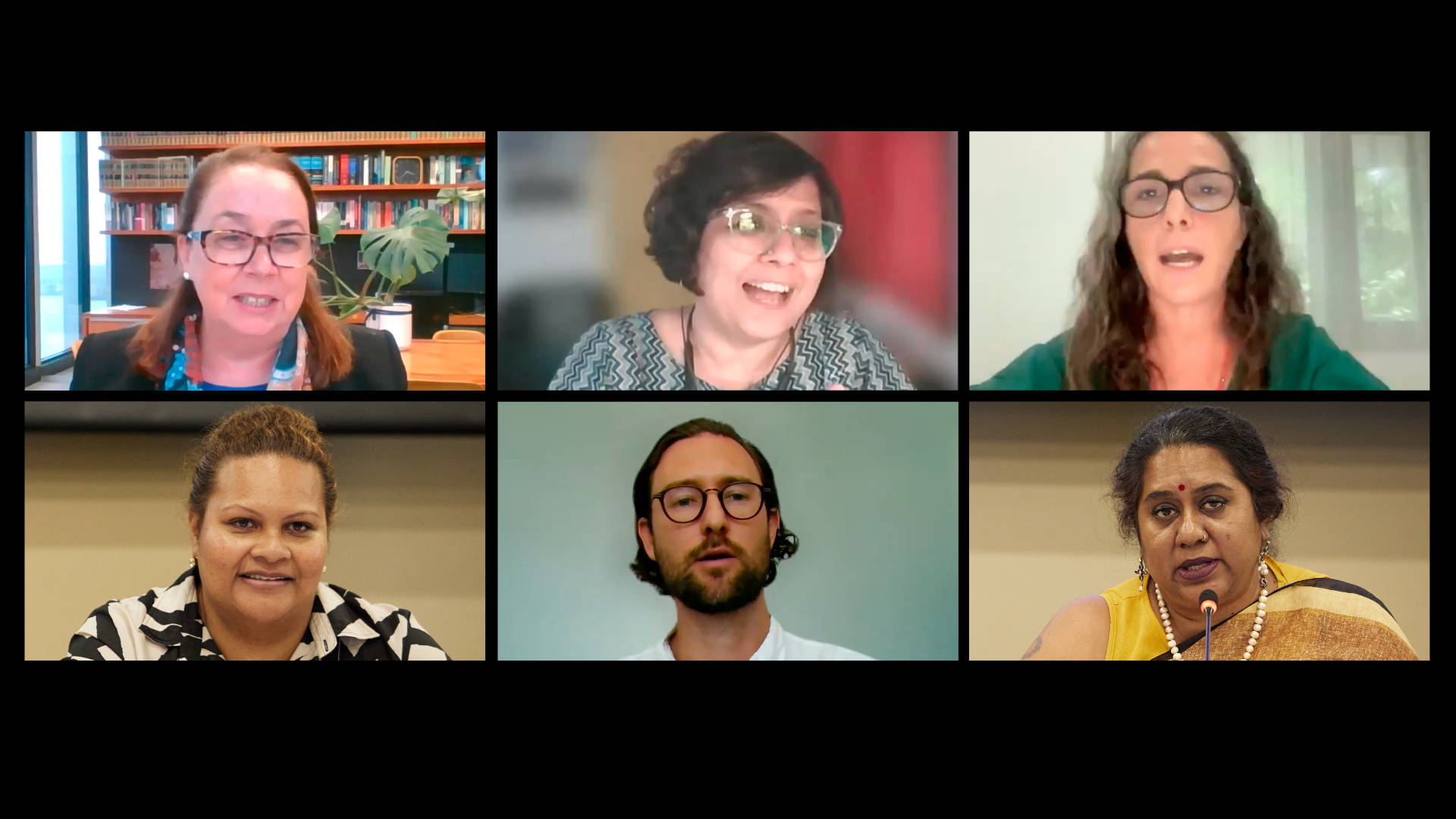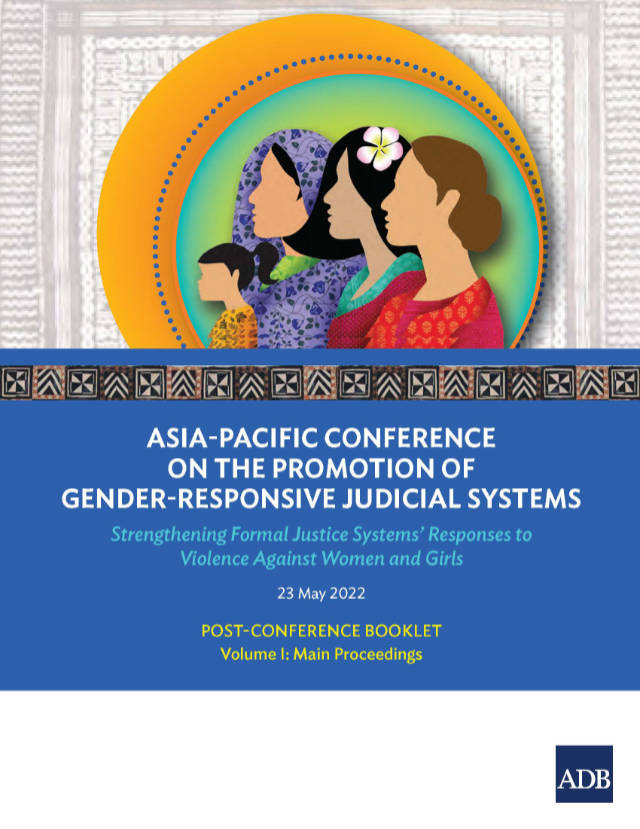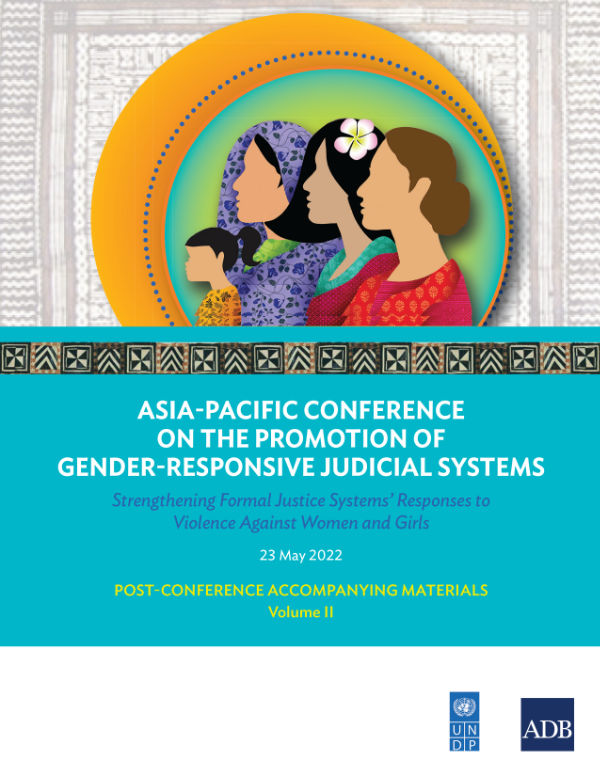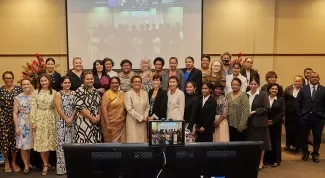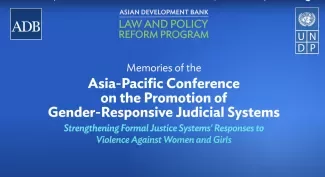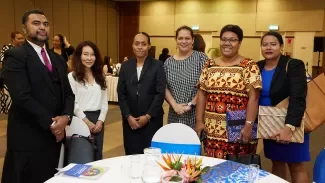Asia-Pacific Conference on the Promotion of Gender-Responsive Judicial Systems
The conference convened justice sector actors and other stakeholders to discuss approaches to strengthening the formal justice systems’ responses to violence against women and girls (VAWG) in the Asia and the Pacific region, and identified common gaps and barriers, good and promising practices and successful outcomes, and shared regional knowledge on better handling and adjudication of VAWG cases. Participants comprised of judges, prosecutors, lawyers, government officials, civil society organizations, academia, development partners and other interested parties.
Globally, 1 in 3 women have experienced physical, sexual, psychological and other forms of violence. In the Asia and the Pacific region, the prevalence of violence against women and girls is also high, with women and girls in the Pacific Island countries facing some of the highest rates of violence globally. Furthermore, the COVID-19 pandemic has exacerbated VAWG and they are facing even higher rates of violence. This harsh reality persists despite laws to protect women and girls against violence. For example, survivors face harmful gender discrimination, bias and stereotyping, social stigma, and inadequate institutional mechanisms to provide them with adequate protection under the formal justice system.
Furthermore, they face other access to justice issues such as low literacy; limited awareness or knowledge of women’s and girls’ rights, cultural and social norms that excuse violence against women or discourage survivors from pursuing formal justice remedies; lack of support from family members and community leaders; and insufficient support services. Evidence and experience suggest that laws alone are not enough to eliminate VAWG and capacity of formal justice sector personnel and stakeholders responsible for handling and adjudicating VAWG cases need to be strengthened, as well as institutional mechanisms to deal effectively and efficiently with VAWG cases. Additionally, complementary tools for increasing legal literacy and access to justice need to be utilized.
Keynote Address

Honorable Chief Justice Antonio Benjamin
National High Court of Brazil (STJ) and President of the Federal Justice Council; President of the Global Judicial Institute on the Environment
Chief Justice Antonio Herman Benjamin discussed gender issues within and outside of the judiciary. Justice sector actors must ensure that women’s rights are fully respected and implemented. By the same token, judges and judicial institutions must take an introspective stocktake and assess how they treat women colleagues.
Opening Ceremony
Affiliations and positions indicated are as of conference date (23 May 2022).
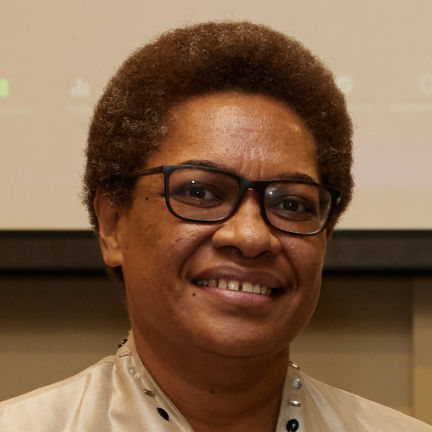
Mereseini Rakuita
Principal Strategic Lead, Pacific Community
Ms. Mereseini Rakuita discussed the barriers that work against women and girls’ effective participation in court processes, as well as key recommendations to address these challenges. Transformative change needs transformative solutions. Reform must be multipronged, multi-layered, and result from consultative engagement processes.
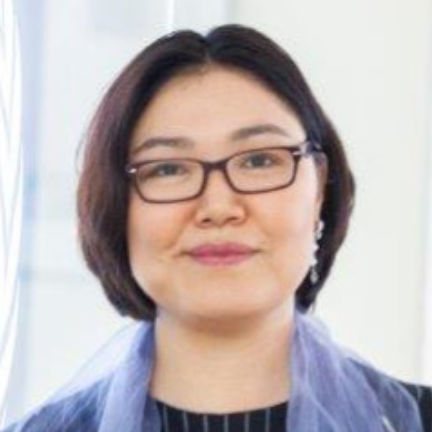
Munkhtuya Altangerel
Resident Representative, United Nations Development Programme
Ms. Munkhtuya Altangerel spoke of women empowerment initiatives in the Timor-Leste context, including parliamentary quotas and gender-responsive budgeting. She also emphasized that while the COVID-19 pandemic magnified systemic issues, it has also presented a greater opportunity to advocate for the rights of women and girls.

Bruce Gosper
Vice-President (Administration and Corporate Management), Asian Development Bank (ADB)
Mr. Bruce Gosper spoke about ADB's critical role in promoting gender equality and gender-responsive judicial systems in the Asia-Pacific region. Throughout the COVID-19 pandemic, ADB has put greater emphasis on mitigating disproportionate impacts on women and girls and on addressing pervasive gender inequalities (such as unpaid care and gender-based violence [GBV]) by strengthening specialized clinics and telephone assistance hotlines for survivors. Under the Office of the General Counsel's Law and Policy Reform Program, ADB works with judges, magistrates, and prosecutors on developing customized capacity building programs and specialized knowledge resources, as well as exploring special mechanisms for more effective and efficient handling of GBV cases.
Setting the Scene: Overview of Violence Against Women and Girls in Asia and the Pacific
Affiliations and positions indicated are as of conference date (23 May 2022).

Samantha Hung
Chief of Gender Equality Thematic Group, Sustainable Development and Climate Change Department Asian Development Bank (ADB)
Ms. Samantha Hung underscored ADB’s commitment to effectively address gender-based violence (GBV), a critical component underpinning the bank’s gender equality work. She also gave an overview of ADB policies, strategies, and initiatives to advance gender equality, such as integrating considerations of women’s safety in project designs; incorporating GBV response into quick-disbursing pandemic response budget support; and technical assistance projects that aim to address access to justice barriers and strengthen the formal justice sector.

Abigail Erikson
Senior Advisor, Ending Violence Against Women and Girls, United Nations Women
Ms. Abigail Erikson gave an overview of how gender discrimination and inequality underpin violence against women and girls across the world. She also discussed access to justice barriers in the Asia-Pacific context and gave a three-point recommendation to address these challenges: (i) a stocktake of gender discriminatory attitudes, (ii) access to quality and essential services, and (iii) ensuring that women and girls know where and how to get help.
Plenary Session 1: Addressing Gender-based Violence in the Formal Justice System – Regional and International Perspectives
Affiliations and positions indicated are as of conference date (23 May 2022).
This session identified gaps, barriers and solutions to achieve fair and effective protection of women and girls in the formal justice system. Discussions included how to ensure victim’s dignity in the legal-judicial process, provide effective protection measures to minimize repercussions and remove fear, and reparation to rebuild lives post violence.
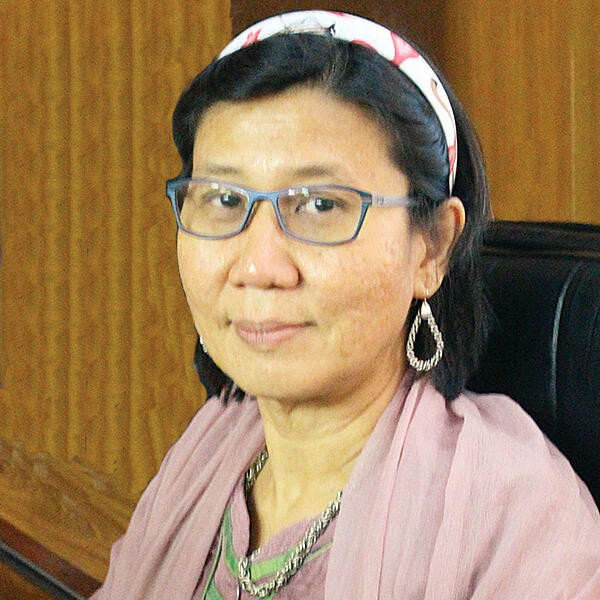
Moderator: Zarizana Abdul Aziz
Gender and Human Rights Lawyer and Adjunct Professor, George Washington University
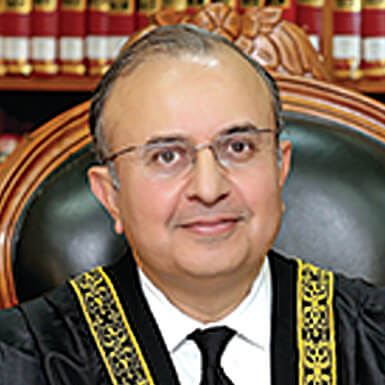
Hon. Justice Syed Mansoor Ali Shah
Supreme Court of Pakistan
Justice Syed Mansoor Ali Shah discussed the Pakistan Supreme Court decision in Atif Zareef v. The State. Disregarding gender stereotypes and emphasizing the importance of evidence in sexual offense cases, the Supreme Court anchored its analysis on the constitutional right to dignity. Justice Shah also discussed the issue of compensation, which courts must look at more holistically, with due consideration to a victim-survivor’s employment needs, economic loss, and psychological and mental trauma.
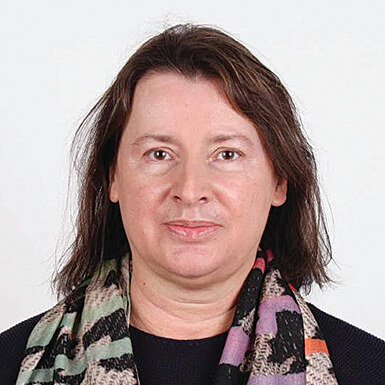
Genoveva Tisheva
Member - Committee on the Elimination of All Forms of Discrimination against Women (Convention on the Elimination of All Forms of Discrimination against Women [CEDAW]), Managing Director - Bulgarian Gender Research Foundation, Chairperson - Alliance for Protection from Gender-Based Violence
Ms. Genoveva Tisheva discussed the framework under the Convention on the Elimination of All Forms of Discrimination against Women, which is the principal source of international standards concerning women's rights, dignity, autonomy, economic independence, and empowerment. She also highlighted several cases on gender-based violence considered by the CEDAW Committee through the communication procedure under the Optional Protocol, along with the relevant General Recommendations (Nos. 19, 33, and 35).

Miliana T. Tarai
Legal Services Manager, Fiji Women’s Crisis Centre (FWCC)
Ms. Miliana T. Tarai discussed nine reasons that drive victim-survivors of gender-based violence away from the formal justice system and cause them to lose confidence in the judicial process. She likewise outlined FWCC’s legal reform initiatives aimed at correcting systemic issues.
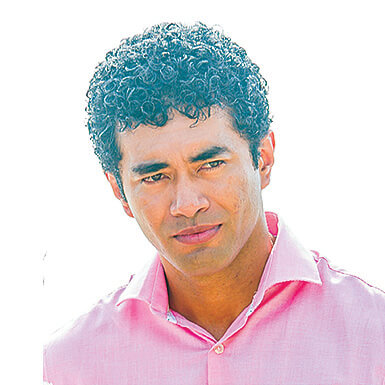
Tevita Seruilumi
Family and Sexual Violence and Gender Equality, Disability and Social Inclusion Adviser Justice Services for Stability and Development, Papua New Guinea
Mr. Tevita Seruilumi discussed two interrelated pathways to promote gender-sensitive judicial systems. First, the capacity of justice sector actors—police officers, lawyers, prosecutors, and the judiciary—must be strengthened. Second, domestic violence must be addressed as a serious crime. Lenient approaches towards domestic violence perpetrators are an ongoing issue in the Pacific, as domestic violence continues to be viewed as a minor offense.
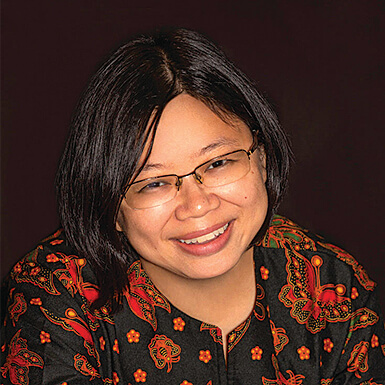
Andy Yentriyani
Chairperson, Indonesian National Commission on Violence Against Women(Komisi Nasional Anti Kekerasan terhadap Perempuan / Komnas Perempuan)
Ms. Andy Yentriyani discussed Indonesia's Anti-Sexual Violence Law, 2022, and the measures adopted therein to support an integrated criminal justice system. These measures include (i) protection of victims of online sexual violence, (ii) prohibition to sue for defamation victim-survivors who allege or report cases of sexual violence, and (iii) the prerequisite for law enforcers investigating sexual violence offenses to be trained specifically with a human rights and gender perspective. She also discussed various measures that Komnas Perempuan has endorsed to protect the dignity of victim-survivors and strengthen their access to justice.

Emily Morrison
Consultant, Sustainable Solutions Timor-Leste, UNDP Timor-Leste
Ms. Emily Morrison expounded on how courts can effectively protect victim-survivors of gender-based violence. She underscored that clear guidelines and victim support, as well as a monitoring mechanism to ensure effective implementation of policy, are crucial. Support to victim-survivors can come in the form of reparation, although how exactly reparation is carried out is critical.

Facilitator: Laura Arboleda Gutiérrez
Qualified lawyer (Colombia) and Master of Public Policy candidate, The London School of Economics and Political Science
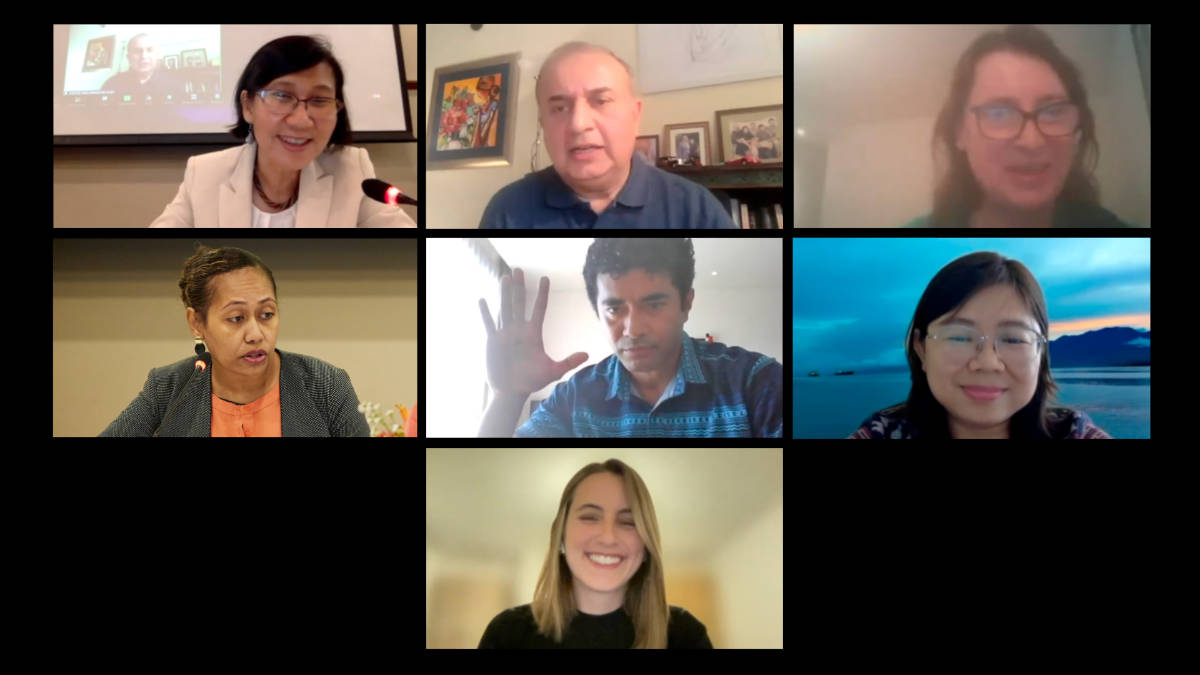
Plenary Session 2: Good Practices in Increasing Confidence in the Formal Justice System – Regional and International Approaches
Affiliations and positions indicated are as of conference date (23 May 2022).
This session presented initiatives implemented by judicial systems to increase access to justice, e.g. specialized GBV judges and prosecutors, mobile courts, fast-tracking, victim-centered approach and online testimony and hearings. It also featured capacity-building programs of justice personnel—during COVID-19, along with notable advocacy tools such as videos and illustrations.

Moderator: Hon. Dr. Robyn Layton AO QC
Former Justice of the Supreme Court of South Australia and Adjunct Professor, University of South Australia
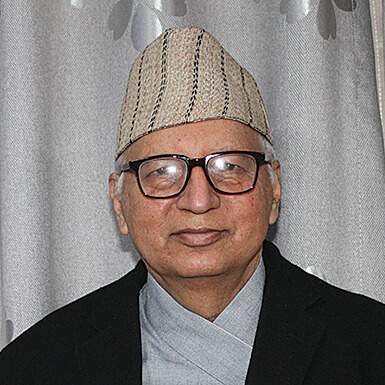
Hon. Justice Ananda Mohan Bhattarai
Supreme Court of Nepal
Justice Ananda Mohan Bhattarai gave an overview of Nepal's legal framework, identifying three parallel developments that contributed to a more progressive and gender-responsive judicial system. He also explained how sexual offenses are dealt with under Nepal’s new codes, and how gender justice is achieved for women and girls in practice. Finally, Justice Bhattarai discussed the way in which compensation, particularly in relation to GBV, is addressed during the sentencing process. He underscored that compensation is now an overarching concept in criminal justice, requiring consideration of the victim’s perspective.

Hon. Judge Robyn Tupman
District Court of New South Wales, Australia, Secretary Treasurer - The International Association of Women Judges
Judge Robyn Tupman discussed the setup, implementation, and effectiveness of the Child Sexual Offence Evidence Pilot Scheme in New South Wales, Australia. The program introduced a process whereby all evidence of children—not just evidence in chief, but all evidence—would be prerecorded and dealt with as quickly as possible. The resulting product would then be played as the evidence of that witness at the trial. Judge Tupman also highlighted the resources required to ensure that the system is effective, both in terms of judges and support staff.
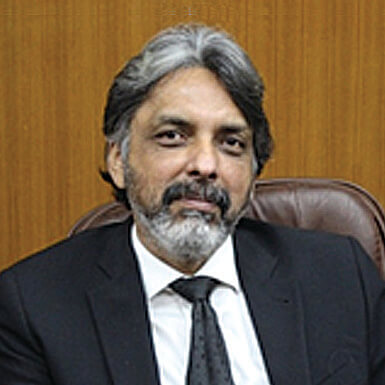
Hon. Judge Shazib Saeed
District and Sessions Judge/Director General, Case Management, Lahore High Court/Visiting Faculty, Punjab Judicial Academy, Pakistan
Judge Shazib Saeed shared his experience with setting up the first gender-based violence (GBV) court in Lahore, Pakistan. In one year, the GBV court in Lahore yielded significant success, fast‑tracking the resolution of GBV cases and increasing the conviction rate for rape cases four‑fold, from 4.25% to 16.5%, with more gender sensitive approaches and processes.
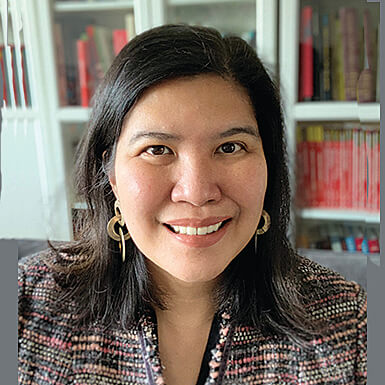
Rea Abada Chiongson
Senior Legal Adviser on Gender, International Development Law Organization
Ms. Rea Abada Chiongson discussed an upcoming research report on access to justice in complex contexts, including the overlapping challenges posed by the health pandemic, natural disasters, conflict, fragility, legal pluralism, and organized crime. Central themes that emerged relate to specialized mechanisms or units (e.g., specialized courts); the role of protection orders and women professionals in building confidence in the justice system; and specialized mechanisms for data collection and review.
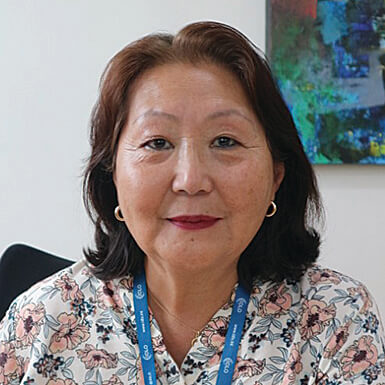
Jargalan Avkhia
Field Program Manager–Mongolia, International Development Law Organization
Ms. Jargalan Avkhia talked about IDLO's Strengthening the Response to Gender-Based Violence in Mongolia Project, which aims to enhance access to justice for victims of domestic violence by incorporating a victim-centered approach. Concrete recommendations from the trial monitoring research relate to victim’s safety and her rights to access information and compensation. In terms of the justice chain research, recommendations relate to (i) providing legal assistance to indigent victims, (ii) employing victim-centered approach mechanisms by treating survivors with care and compassion, (iii) strengthening the capacity of justice sector actors on specific needs and vulnerabilities of domestic violence survivors, and (iv) preventing victim-blaming and gender stereotypes.

Samar Minallah Khan
Communications and Behavior Change Specialist and International Filmmaker
Ms. Samar Minallah Khan shared her overall approach to addressing gender-based violence through prevention strategies, informed by her background as an anthropologist and documentary filmmaker. With regard to building the capacity of judges and prosecutors, Ms. Khan observed that the COVID-19 pandemic has changed the training landscape. She discussed the importance of harnessing technology to reach out to justice sector actors, such as through interactive e-modules that have various elements—e.g., visuals, podcasts, explainer videos, quizzes—to sustain the learner's or viewer’s interest.

Facilitator: Nikita Singh
Qualified lawyer (Australia) and Master of Public Policy candidate, The London School of Economics and Political Science
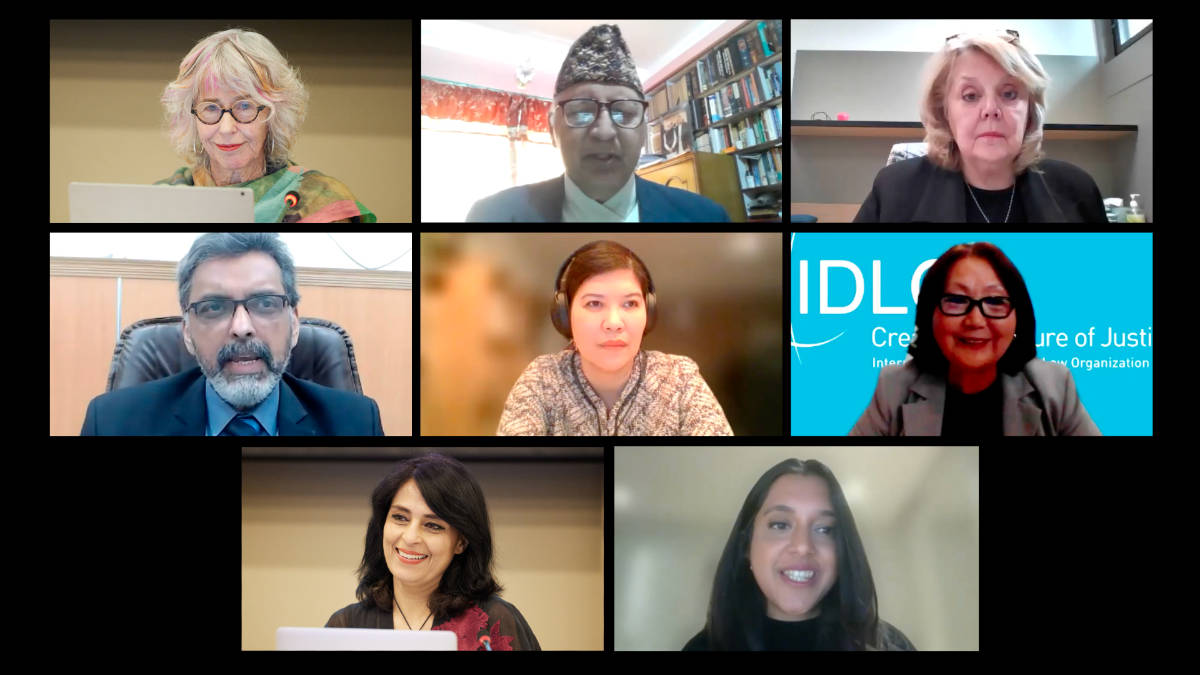
Breakout Session 3A: Concurrent Breakout Session for Judges
Affiliations and positions indicated are as of conference date (23 May 2022).
Judges from Asia and the Pacific region and beyond shared their experiences in adopting good practice measures applying gender perspectives in adjudicating GBV cases, and discussed specialized mechanisms, judicial tools, and knowledge resources.

Session Moderator: Hon. Dr. Robyn Layton AO QC
Former Justice of the Supreme Court of South Australia and Adjunct Professor, University of South Australia
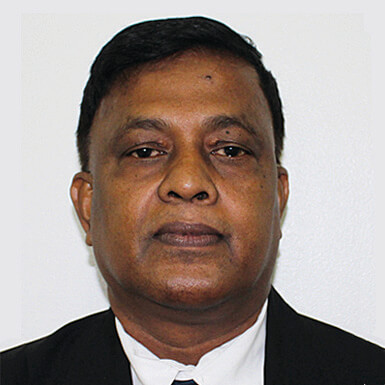
Hon. Chief Justice Kamal Kumar
Supreme Court of Fiji
Chief Justice Kamal Kumar shared notable legislative measures and court processes in Fiji that afford protection to women and girl victim‑survivors and strengthen their access to the formal justice system. First, Fiji has a comprehensive set of laws on sexual offenses, primary of which is the Domestic Violence Act 2009. Second, vulnerable victim-survivors and witnesses are afforded protections in the courtroom. Third, the creation of a sex offenders register allows government authorities to quickly retrieve information about the identity of sex offenders, his personal details (e.g., passport details and active social media accounts), and how sexual offense cases were resolved. Fourth, the no-drop policy, which came into effect in 2020, mandates that the police adopt a zero-tolerance policy on GBV. Fifth, capacity development for members of the judiciary is crucial.

Hon. Judge Robyn Tupman
District Court of New South Wales, Australia, Secretary Treasurer - The International Association of Women Judges
Hon. Judge Robyn Tupman shared the setup, implementation, and effectiveness of the Child Sexual Offence Evidence Pilot Scheme, 2015 in New South Wales, Australia. She emphasized that the evidence of child victim-survivors should be secured as soon as possible after a complaint is made. The ability to promptly gather evidence effectively addresses a typical cross-examination strategy that casts doubt on children’s memories because they do not last very long and/or are not sufficiently detailed. Judge Tupman articulated the lessons learned from the pilot evidence program in a series of “do’s” and “do not’s”: (i) do educate; (ii) do take everybody on board; (iii) do not forget it is a court of law; and (iv) do not get the technology wrong.

Hon. Justice Vui Clarence Nelson
Supreme Court of Samoa and Member, Committee on the Rights of the Child (Convention on the Rights of the Child)
Hon. Justice Vui Clarence Nelson shared Samoa’s progress in promulgating laws and institutionalizing practices to protect the rights of women and child victim-survivors of GBV. He talked about (i) The Family Safety Act, 2013, which provides for protection orders and a comprehensive array of protective mechanisms for domestic violence victims; (ii) The Sex Offenders Registration Act, 2017, which requires a registry of local offenders and offender-deportees from Australia, New Zealand, and the United States; (iii) a child welfare care and protection legislation pending before Parliament, aimed at establishing a comprehensive system for child protection; and (iv) Samoa’s compliance with the Paris Principles. Justin Nelson also spoke of institutional reforms, such as the establishment of specialized courts. Finally, he gave his opinions on what more could be done to promote a truly gender-responsive judicial system.
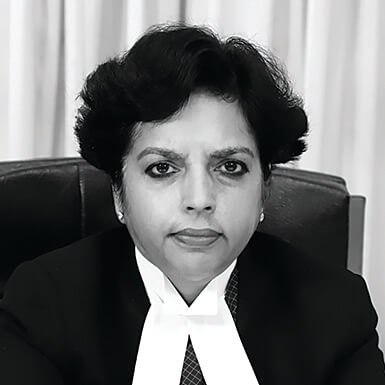
Hon. Justice Hima Kohli
Supreme Court of India
Hon. Justice Hima Kohli talked about India’s Protection of Women from Domestic Violence Act, 2005 and other good practices in India that protect and support women victim-survivors of gender-based violence. First, the definitions of “vulnerable woman” and “male respondent” were expanded through judicial interpretation of the Protection of Women from Domestic Violence Act, 2005. Second, the Crime Against Women (CAW) cells established in the early 1980s in New Delhi have now been replicated across the country. Third, specialized courts (e.g., Women’s Court and Fast-Track Court) have been established. Fourth, the Victim Compensation Scheme was introduced by the government in 2018. Under this scheme, the government has a corpus of funds that court can dip into for compensation at the end of a trial.
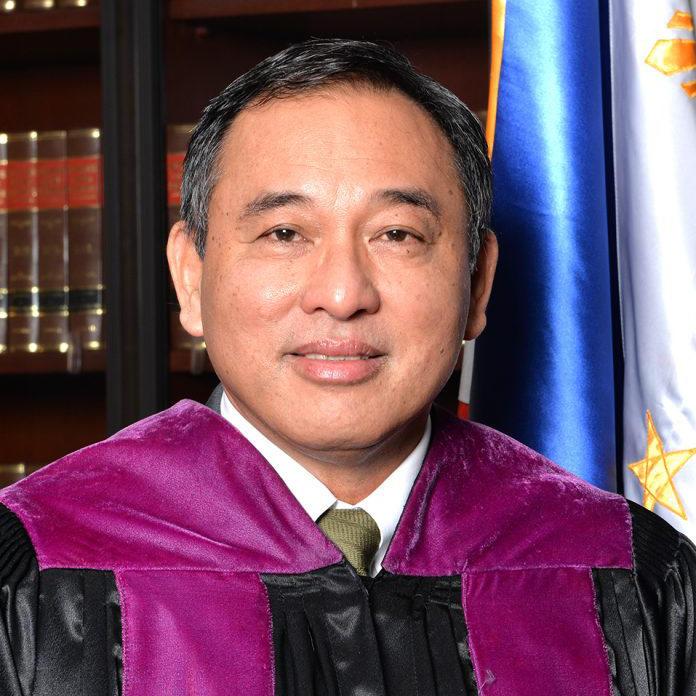
Hon. Justice Henri Jean Paul B. Inting
Supreme Court of the Philippines
Hon. Justice Henri Jean Paul B. Inting talked about initiatives of the Philippine Supreme Court’s Committee on Gender Responsiveness in the Judiciary, including issuance of Guidelines on the Use of Gender-Fair Language in the Judiciary and Gender-Fair Courtroom Etiquette, 2022. The guidelines direct court officials and employees to make a conscious effort to avoid implicit and explicit discriminatory language against men or women. Justice Inting also spoke of the court practices in place that aim to protect both children and women, such as the rule on examination of child witnesses and the rule protecting the identity of women and child victims. The Supreme Court-issued Administrative Circular No. 83-2015 (or the Protocols and Procedures in the Promulgation, Publication, and Posting on the Websites of Decisions, Final Resolutions, and Final Orders Using Fictitious Names) mandates the use of fictitious initials like AAA or XXX when referring to the names of women and children victims, as well as their personal circumstances or other information which may establish or compromise, directly or indirectly, their identities.

Facilitator: Maria Cecilia T. Sicangco
Senior Legal Officer, ADB
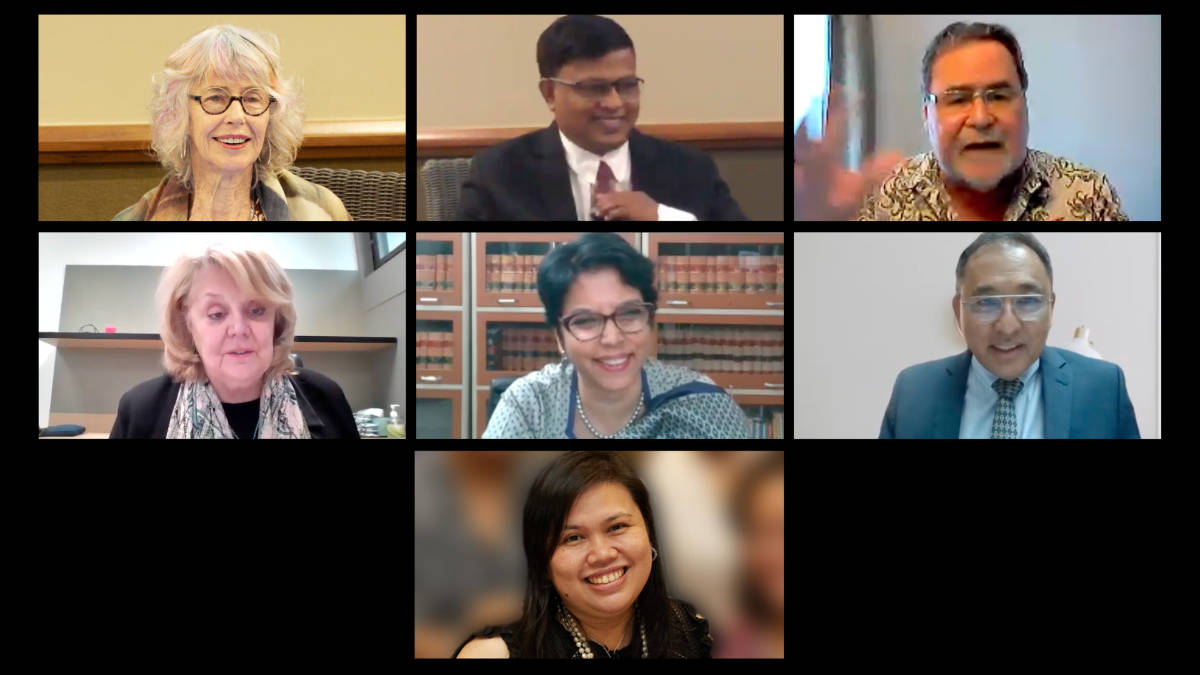
Breakout Session 3B: Concurrent Breakout Session for Prosecutors
Affiliations and positions indicated are as of conference date (23 May 2022).
Prosecutors from the Asia and the Pacific region and beyond discussed issues and challenges in investigating and handling violence against women and girls cases and shared experiences in adopting good practice measures.

Moderator: Zarizana Abdul Aziz
Gender and Human Rights Lawyer and Adjunct Professor, George Washington University
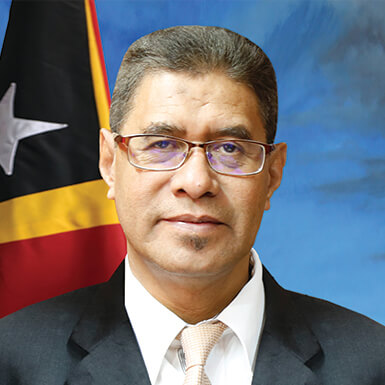
H.E. Dr. Alfonso Lopez
Prosecutor General, Timor-Leste
H.E. Dr. Alfonso Lopez gave an overview of penal and statutory laws governing violence against women and girls (VAWG) in Timor-Leste. He also discussed the role of and difficulties faced by the Public Prosecution Office in implementing these laws and investigating gender-based violence cases. Finally, Dr. Lopez discussed his recommended reforms. He believes that the Criminal Procedure Code should be amended to, among others, (i) extend the ‘statements for future use’ so that this is used in all situations involving VAWG; (ii) establish a maximum deadline to undertake an inquiry and to have a trial concerning VAWG; (iii) encourage professional support (e.g., from psychologists) to assist Public Prosecution magistrates and judges in technical matters in the context of an interdisciplinary approach to the cases, and to promote a more effective judiciary; and (iv) provide additional and specialist trainings to Public Prosecution and judicial magistrates, who can disseminate learnings to criminal investigation police officers and court clerks.

Hon. Justice Sandi McDonald
Supreme Court of South Australia and former Acting Director of Public Prosecutions
Hon. Justice Sandi McDonald discussed substantial reforms undertaken to strengthen the prosecution of domestic violence cases in South Australia. She framed her discussion using the case of Zialloh Abrahimzadeh, which served as catalyst for these reforms. She spoke of the recommendations that arose from the coroner’s inquest, such as (i) conducting risk assessments; (ii) training officers and the police; (iii) ensuring that any person who files a complaint of domestic violence be put through to someone with expertise in that area; and (iv) ensuring that domestic violence victims who want to withdraw charges go through a process that affirms that they have been counseled, understand the decision they are making, and no one has influenced them in any way. Justice McDonald also pointed out that to effectively uphold the law, one must understand cultural context and how this impacts the prosecution of a case, e.g., in considering what a “good outcome” would be.
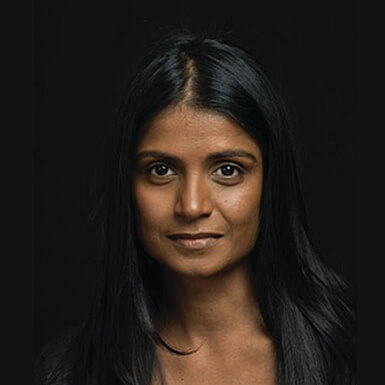
Shyamala Alagendra
Gender Advisor, United Nations Sri Lanka Accountability Team, Former Prosecution Trial Lawyer, International Criminal Court, and Former Assistant Director of Public Prosecutions, Fiji
Ms. Shyamala Alagendra discussed the importance of a survivor-centered and trauma-informed approach in the prosecution and handling of sexual and domestic violence cases, especially those involving child witnesses and/or victims. Ms. Alagendra emphasized that this approach goes beyond the provision of counseling and medical care: (i) being sensitive to signs and symptoms of trauma since all witnesses and victim-survivors of crime are traumatized, even as trauma manifests in different ways for different people; (ii) showing witnesses and victim-survivors empathy (as opposed to sympathy), putting aside biases and assumptions and interacting with them in a gender and culturally sensitive way; (iii) allowing victim-survivors to tell their story in an uninterrupted manner and in a chronology and style that enables them to recall events as completely and as effectively as possible; (iv) labeling crimes appropriately and charging crimes accurately to reflect the gravity of conduct; and (v) empowering victim-survivors to make informed choices. Finally, Ms. Alagendra discussed important matters for prosecutors to keep in mind when dealing with child witnesses, such as taking a multi-disciplinary approach (i.e., prosecutors should not push out other actors).

Facilitator: Lea Halberstein
Juris Doctor (JD) candidate, Northeastern University School of Law
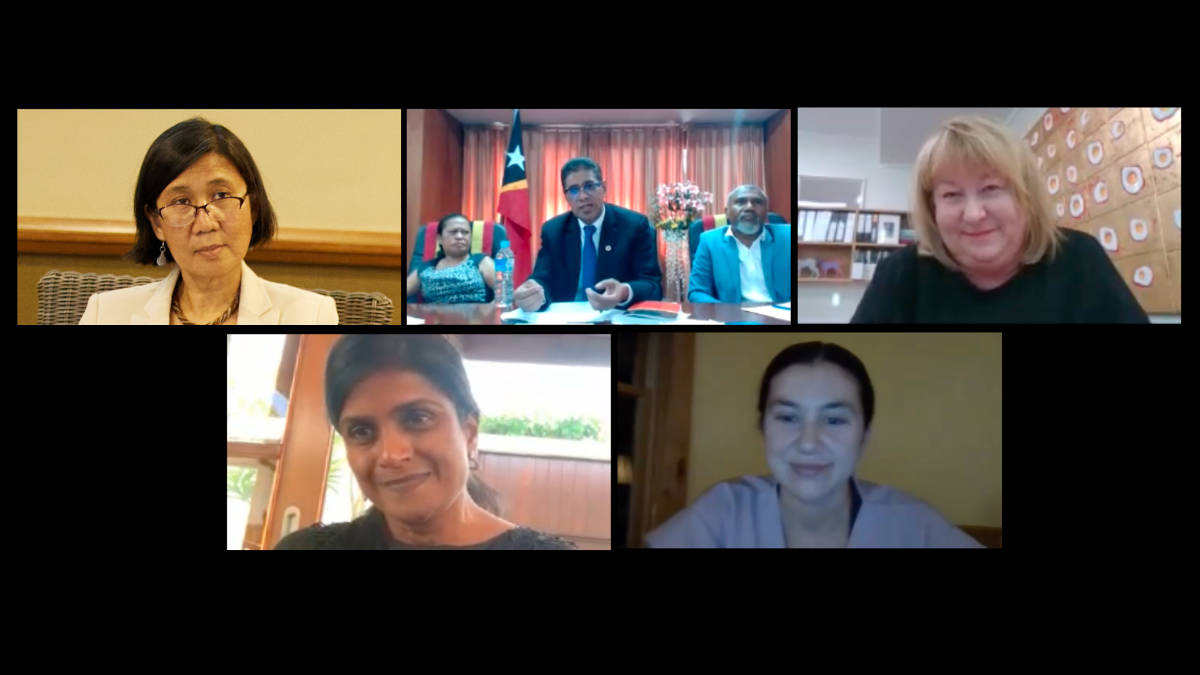
Breakout Session 3C: Concurrent Breakout Session for Victim/Survivor Advocates and Civil Society Organizations
Affiliations and positions indicated are as of conference date (23 May 2022).
Participants from victim/survivor advocacy groups and civil society organizations exchanged experiences in adopting good practice measures applying gender perspectives and standards of practice and guidelines in violence against women and girls cases. They also discussed examples to improve the formal judicial system.
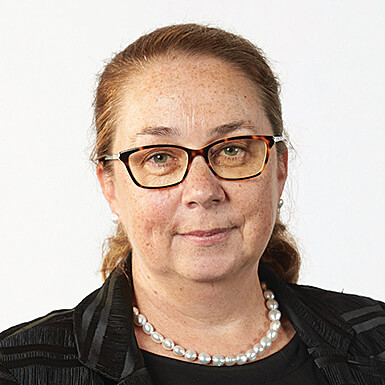
Moderator: Kate Eastman AM SC
Human Rights Lawyer
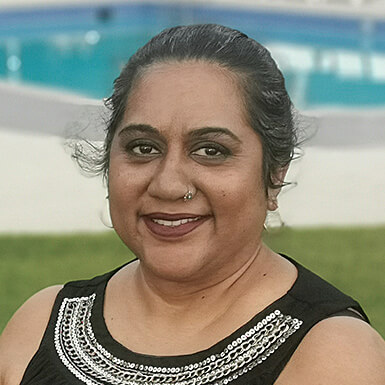
Nalini Singh
Executive Director, Fiji Women’s Rights Movement
Ms. Nalini Singh gave an overview of research findings and recommendations from Balancing the Scales: Improving Fijian Women’s Access to Justice, a report that took a stocktake of the Fijian legal system several years after Parliament passed the Family Law Act 2003, the Domestic Violence Act 2009, and the Crimes Act 2009. One significant finding was that Fijian women took an average of 868 days to seek help from the formal justice sector. She then spoke of how her organization seeks to address these concerns, particularly the issue of justice pathways. Finally, she discussed the additional gaps that have emerged since the report was published. Ms. Singh recommended that a study be undertaken on the response of the judiciary and what happens to victim-survivors who do not reach the formal justice sector.

Bárbara de Oliveira
Partner, JU,S, Jurídico Social Consultoria, Timor-Leste
Ms. Bárbara de Oliveira shared how her organization, a social enterprise in the legal sector in Timor-Leste, seeks to advance victim-survivor’s rights. She discussed the challenges in carving out and promoting the role and powers of victim-survivors in legal practice and judicial interpretation, when there have been very little before. She concluded with six important lessons JU,S has learned from its experience, including paying attention to the social and psychological aspects of a case.

Asmita Basu
Law, Gender, and Human Rights Specialist
Drawing from her research and on-the-ground experience in India, Ms. Asmita Basu shared three pressing concerns of victim-survivors of gender-based violence and how these could be addressed. First, the current legal framework must be assessed to see whether it is gender-just and adequate. Women continue to be in abusive or violent situations because of other discriminatory laws—whether in relation to access to matrimonial property or other property rights, custody rights in the context of domestic violence, or cases of sexual harassment due to unfair labor laws or job security concerns. Second, with respect to access to justice barriers, legal and judicial stakeholders have a two-fold responsibility: they must examine the hurdles that discourage women from accessing the law, and likewise find ways to facilitate access to the formal justice system. Finally, even good laws must be reviewed to determine how effective they are in practice.
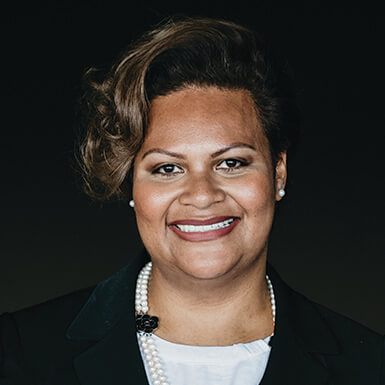
Liliwaimanu Vuiyasawa
Gender and Child Care Consultant, Gender Economic Inclusion Group, International Finance Corporation
Ms. Liliwaimanu Vuiyasawa shared her observations and experiences as a survivor advocate and family law practitioner with the advent of the Fiji Family Law Act in 2003. She also flagged some other matters of concern, e.g., notions around gender are often not considered in the formal justice system. She likewise recommended that the Domestic Violence Act 2009 and the Crimes Act 2009 be applied in a parallel manner; otherwise, a miscarriage of justice occurs. Finally, Ms. Vuiyasawa opined that law enforcement and application remain a challenge in Fiji, making finding willing plaintiffs a greater challenge.

Henry Cornwell
Counsel, Asian Development Bank (ADB)
Mr. Henry Cornwell gave an overview of ADB’s law reform work in relation to gender-based violence. He discussed ADB’s engagement with judges, which is focused on (i) training them to better understand the ways in which GBV and related cases could affect the rights and well-being of victims, and (ii) doing what is necessary to improve survivors’ opportunities for gender justice and procedural fairness even under challenging circumstances. He gave an overview of possible paths forward, including building on the work of the women’s rights organizations to bring empirical analysis into the question of how to treat GBV cases.

Facilitator: Nelania Sarmento
Communications and Liaison Officer (Consultant), ADB

Facilitator: Zhansaya Imanmadiyeva
Master of Public Policy candidate, Graduate School of Public Policy, University of Tokyo
